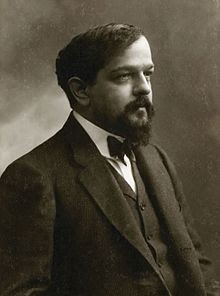| Edit | Map | Home | New Post | New Gallery |
Support
|
 | |
Claude Debussy (full name: Achille-Claude Debussy, fr. Achille - Claude Debussy [a?il klod d?bysi]) composer. A leading representative of musical impressionism. He was born on August 22, 1862 in Saint-Germain-en-Laye (a suburb of Paris) in the family of a small merchant - the owner of a small earthenware shop. When Claude was two years old, his father sold his shop, and the whole family moved to Paris, where Debussy Sr. got a job as an accountant in a private firm. [1] Almost all of Claude Debussy's childhood was spent in Paris, excluding the time of the Franco-Prussian War, when the future composer's mother went with him to Cannes, away from hostilities. It was in Cannes that young Claude began taking his first piano lessons in 1870; after returning to Paris, classes continued under the leadership of Antoinette Motte de Fleurville, the mother-in-law of the poet Paul Verlaine, who also called herself a student of Frederic Chopin.
In 1872, at the age of ten, Claude entered the Paris Conservatory. In the piano class he studied with the famous pianist and teacher Antoine Marmontel, in the elementary solfeggio class with the famous traditionalist Albert Lavignac, and he was taught the organ by César Frank himself. At the conservatory, Debussy studied quite successfully, although as a student he did not stand out in anything special. Only in 1877, the professor appreciated Debussy's piano talent, awarding him the second prize for the performance of the Schumann sonata. Being in Emile Durand's harmony and accompaniment class generally led to an open conflict between the student and the teacher. Faithful to the school textbook of harmony, Durand could not submit to even the most modest experiments of his student. Not forgetting his clashes with the teacher, many years later Debussy wrote about this episode of his studies: "Harmony in the form it is taught in the conservatory is an arrogant and ridiculous way of sorting sounds." [1]
Debussy began to systematically study composition only in December 1880 with a professor, a member of the Academy of Fine Arts, Ernest Guiro. Six months before entering the class, Giraud Debussy traveled through Switzerland and Italy as a home pianist and music teacher in the family of the rich Russian patron Nadia von Meck. Debussy generally spent the summer of 1881 and 1882 near Moscow, in its Pleshcheevo estate [1]. Communicating with the Von Meck family and staying in Russia had a beneficial effect on the young musician's development. In her house, Debussy got acquainted with the new Russian music of Tchaikovsky, Borodin, Balakirev and composers close to them. In a number of von Meck's letters to Tchaikovsky, a certain "sweet Frenchman" was sometimes mentioned, who raves about his music and reads scores perfectly. Together with von Meck, Debussy also visited Florence, Venice, Rome, Moscow and Vienna, where he first heard the musical drama "Tristan and Isolde", which for a good ten years became the subject of his admiration and even worship [1]. The young musician lost this equally pleasant and profitable job due to inappropriate love for one of von Meck's numerous daughters. (In 1913, Serhii Kusevitsky organized Debussy's concerts in Moscow, where Debussy met Sonya von Mekka (Sofia Golitsyn). From their conversation: - I heard your Preludes. I especially liked "The Girl with Flaxen Hair". - It's about you) [ source not specified 275 days ] .
After returning to Paris, Debussy, in search of income, entered the vocal studio of Madame Moreau-Senti as an accompanist, where he met the rich amateur singer and music lover Madame Vanier. She significantly expanded the circle of his acquaintances and introduced Claude Debussy to the circles of Parisian artistic bohemia. For Vanier, Debussy wrote several exquisite romances, among which such masterpieces as "The Mandolin" and "Under the Sound" turned out to be. [1]
At the same time, Debussy continued his studies at the conservatory, trying to achieve recognition and success also among his colleagues, academic musicians. In 1883, Debussy received the second Rome prize for the cantata "Gladiator". Not stopping there, he continued his efforts in this direction and a year later, in 1884, he received the Great Rome Prize for the cantata "The Prodigal Son" (fr. L'Enfant prodigue). Strangely, as moving as it is unexpected, this happened thanks to the personal intervention and benevolent support of Charles Gounod. Otherwise, Debussy would certainly not have received this cardboard professional crown of all academics from music. "This kind of certificate of origin, education and authenticity of the first degree," as Debussy and his friend Eric Satie later jokingly called the Rome Prize among themselves. [2]
Claude Debussy. Portrait of the work of Marcel Bosch, 1884 In 1885, with extreme reluctance and being late for two months (which was a serious violation), Debussy nevertheless went to Rome at the public expense, where he was supposed to live and work for two years at Villa Medici, along with other laureates of the prize. The entire early period of Debussy's life was spent in such harsh duality and internal contradictions. |
Author: Sonya Version: 1 Language: English Views: 0
|
Short link: https://www.sponsorschoose.org/a189
Short link to this version: https://www.sponsorschoose.org/n215
Created by Sonya at 2023-05-31 07:21:50
Last modified by Sonya at 2023-06-03 16:39:27
|